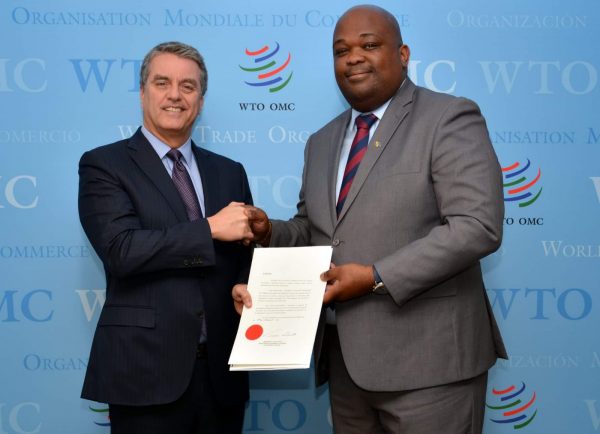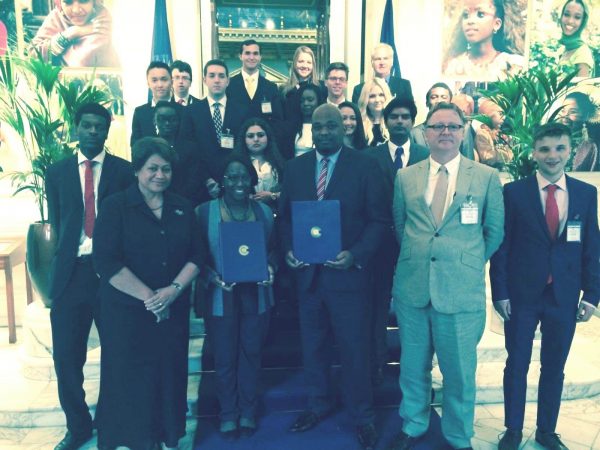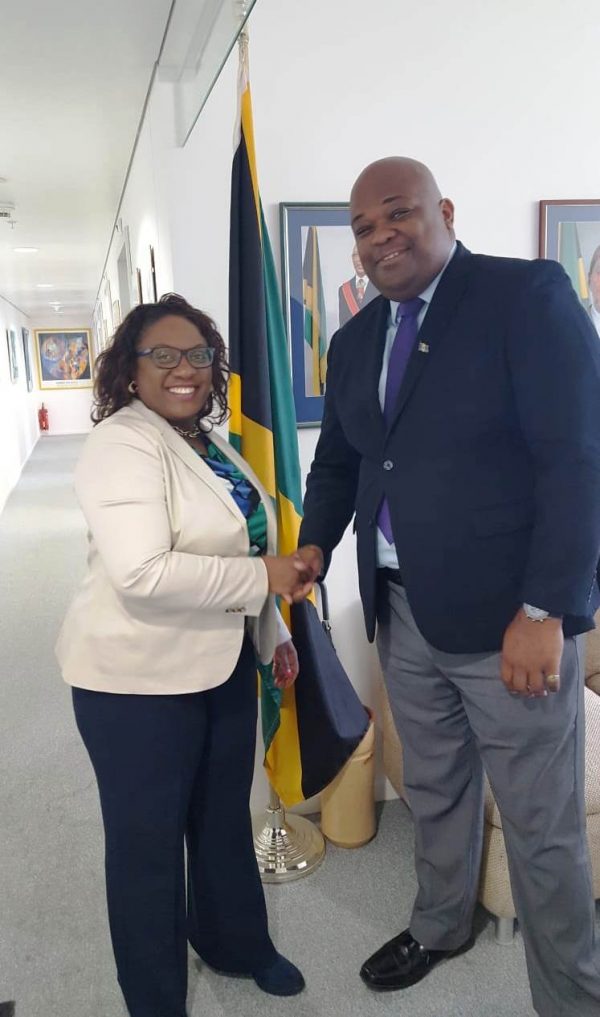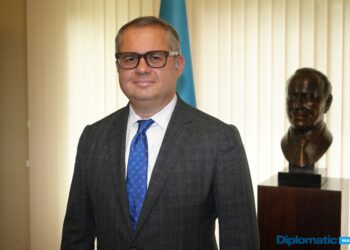By Victor Gotevbe, Publisher/ Editor-in-Chief
Ambassador Chad Blackman is Barbados’ Permanent Representative to the United Nations and Other International Organizations in Geneva. He is a British trained International Trade Law Specialist and was a Senior Partner/ International Trade Advisor at Global Partners International (GPI) where he led the firm’s team on the European Union (EU) General Data Protection Regulation (GDPR). He studied for the LLB Law and LLM International Trade Law at the University of Essex in the United Kingdom. He speaks both French and Spanish fluently. In this Special interview with Diplomatic Watch, Ambassador Chad talks about a number of topical issues including the significance of Barbados as a desirable investment destination, how the country prides itself as a just society in meeting its economic objectives and why it continually pursues a path of growth. Excerpt:
Please can you share your experience on how you became Barbados’ Permanent Representative to the United Nations and Other International Organizations in Geneva?
I was appointed by Barbados’ Prime Minister Mia Mottley, Q.C M.P as Barbados’ Ambassador. Given my background in international trade law, international development and global private sector advisory fields, I was asked to lead the country’s Permanent Mission in Geneva.
What was your first day in the office like?
Having arrived at the Mission, I was welcomed by our Mission’s staff, and I convened a meeting with the entire team, where I was formally introduced, and we discussed the way forward for the Mission. Additionally, I received a number of briefs and prepared for the week ahead. It served to be a very productive welcome.

How did you end up studying International Trade in Britain? What has that done for your career now that you are a Diplomat?
Given the UK’s global reputation and expertise in law, I gravitated towards both the LLB Law and LLM International Trade Law degrees at the University of Essex. The myriad of experts in their respective fields, who taught at the institution allowed students in the School of Law to have a firm command on the intricacies and modalities of the international trade law sphere.
The UK training in both law and international trade law has given me a firm grasp of the complexities of World Trade, and the ability to effectively navigate around the international trade area. A significant part of my skill set must be attributed to the training I received at the University of Essex.
How does your new role as Ambassador Impact positively on Barbados?
Barbados as a developing economy, relies heavily on its ability to trade in goods and services abroad. Given the constant changes in the international trade environment, the ability to ensure that the country’s interests are both protected and advanced in International Geneva will be of critical importance. Issues affecting Small Island Developing States (SIDS) like Barbados climate change, and external shocks in the global economy often time present challenges which must be confronted not only domestically, but at the multilateral level. These realities, therefore, call for me as the country’s Ambassador to ensure that the country’s interests in the evolving international diplomatic and geo-political environment are well articulated and advanced.

Do you see yourself serving in the Economic team of your Government in the near future given your antecedents or you are doing that indirectly?
My current role enables me to further carve out the space needed at the international level to ensure that the framework in which our economy operates, allows for our domestic economic policy to have the latitude to implement the growth and development that is needed. As such, my role therefore serves as part of a wider governmental strategy for the country to pursue its agenda in becoming a thriving economy in the global sphere.
How is your over 15 years of experience in international development going to change the narrative of Barbados’ Economy Diplomacy?
One of the things that I have learnt from my experience in the international development sector, is that whilst there is the pursuit of growth and increased capacity for the country’s productive sectors, this must be both nuanced and balanced with ensuring that it is all done sustainably. At the country’s core, is the belief of pursuing a path of growth by increasing our trading capacity across the world whilst ensuring that both our trading partners and domestic producers operate in a sphere where the rights of workers for example are not disenfranchised as a result The country has and continues to pride itself of being a just society and affirms that the world ought to engage in the same whilst it achieves its economic objectives.

Since you became Ambassador what has been the perception of other States concerning Barbados on the global stage?
Countries I have interacted with in Geneva since I became Ambassador have welcomed the country’s new leadership. There is a renewed sense of progress and as Kofi Annan once said about Barbados, there is the view that we will once again ‘punch above our weight’. This has not only been shared in Geneva but other Ambassadors of Barbados in other capitals of the world have echoed this sentiment.
What are the opportunities in Barbados that make it an investment destination?
Barbados enjoys a highly skilled workforce, allowing for companies to relocate to a jurisdiction that has skills that allows them to a cadre of sophisticated local talent. The country has an expansive double taxation treaty network, excellent technological and physical infrastructure, a stable democracy and an experienced and highly reputed legal system.
Barbados has currently repositioned itself to become the educational hub of the Caribbean and Latin American. Many international tertiary institutions are now looking to offer world-class degrees and programmes in Barbados. Other major areas of investment include (but are not limited to), a robust international business and financial services sector, tourism infrastructure, the green/clean energy sector and high-end value chain services.
Fintech seems to be central to Barbados’ economic growth and there is a conscious effort of the Government with other Stakeholders to chart the way forward for the growing Fintech industry. Can you tell us more about this effort and how it is wooing foreigners to invest in the sector?
The modernization of the country’s economy requires a renewed perspective on the nation’s ability to offer its goods and services locally and abroad in a manner that has hitherto not been seen across the board. Fintech provides a unique platform for Barbados to offer its financial services and products with speed, convenience, reduction of costs per transaction and personalization to the demands of the consumer. Given the world’s move in this direction and the reliance on Barbados for international trade, this allows for the economy to be strategically repositioned to engage in major international commerce, thus allowing significant levels of revenue as a jurisdiction.

Would you say Barbados’ economy is import or export-driven?
The country notwithstanding that it imports a significant number of its goods, Barbados continues to be a major exporter of services across the world. Given the country’s highly-skilled workforce, the country continues to remain a centre for international companies and entities to have their businesses domiciled there. This is buttressed by a stable dollar that is pegged. Many members of the country’s private sector are engaged in the trade of high-end services to clientele abroad. Additionally, there is a continued thrust to export many Barbadian products across the world, which enjoy the ‘Made in Barbados’ brand. One such export is Barbadian rum.
Do Africans particularly from West Africa require a visa to visit Barbados?
Some of them do, but many of them don’t. Barbados as a country has always been open to the idea of exploring reciprocal visa-waiver programmes where possible. Given the country’s continued outlook on the African market for mutual trade and exchanges in the cultural industries and the tourism sectors, there is no better time to explore such possibilities.
Do you have any parting words for young people across the globe who may want to follow your career path?
They must ensure that they are as widely read as possible. This ranges from politics, law, economics and economic development, international trade, human rights and the understanding of history and historical trends. Have a firm grasp of global issues, whilst paying particular attention to their immediate national and local realities. Education will play a critical role in the pursuit of diplomacy. The ability to speak as many foreign languages will allow for greater success. Lastly, a grounding in the way organizations at the NGO and intergovernmental levels interface and negotiations will serve any young person well in the pursuit of diplomacy.









